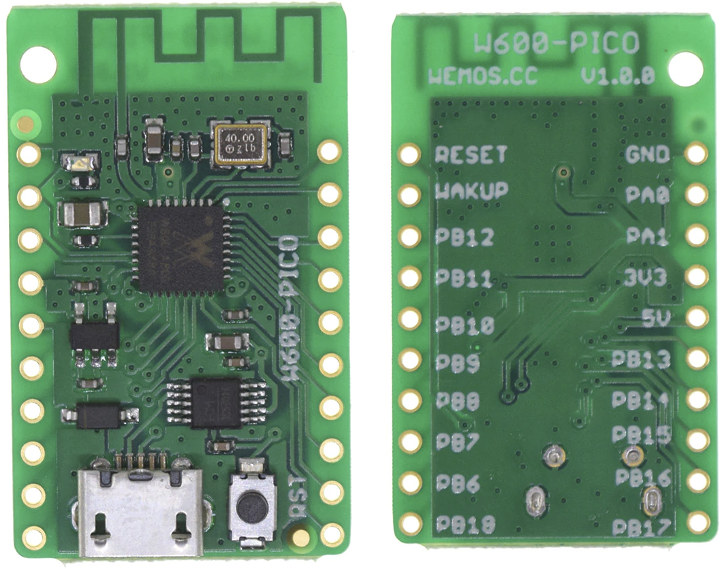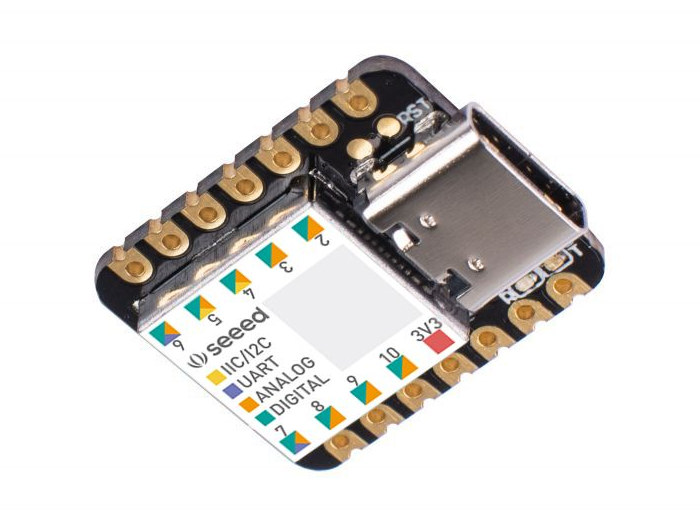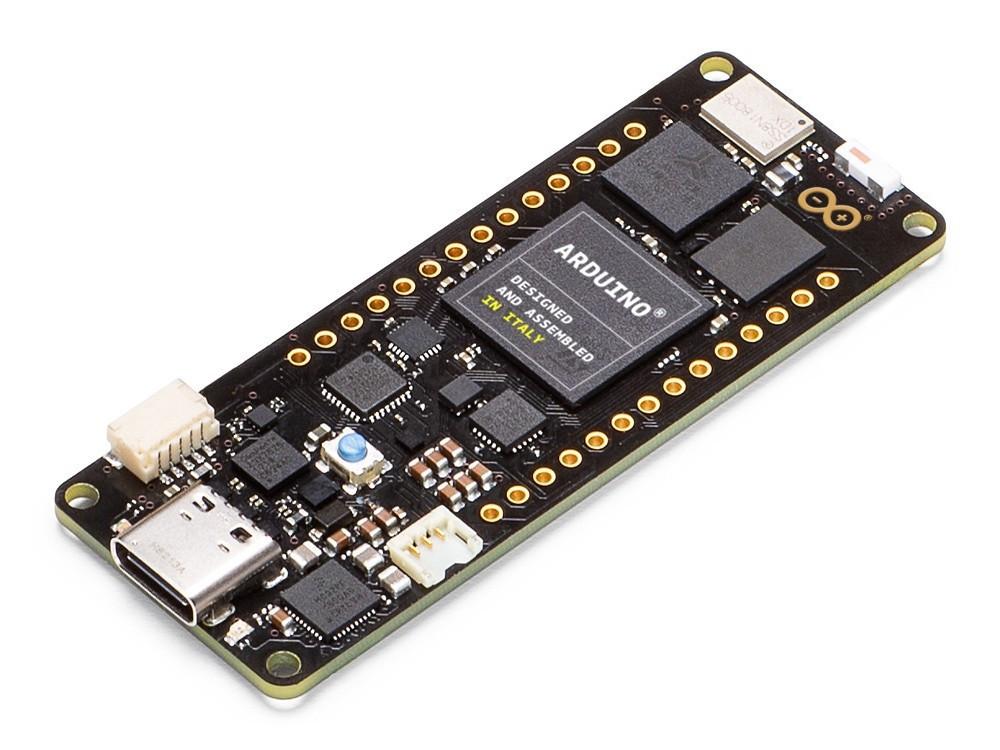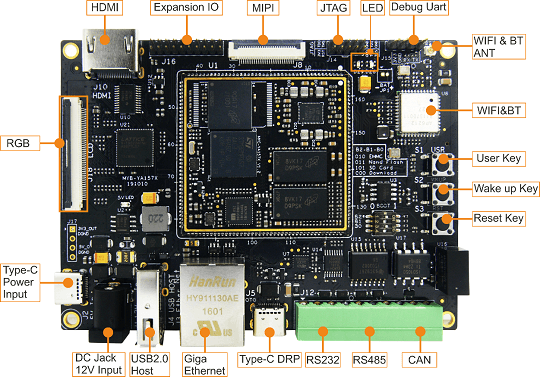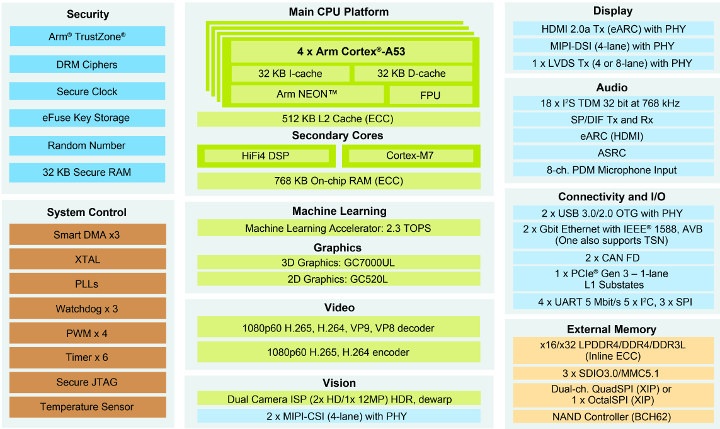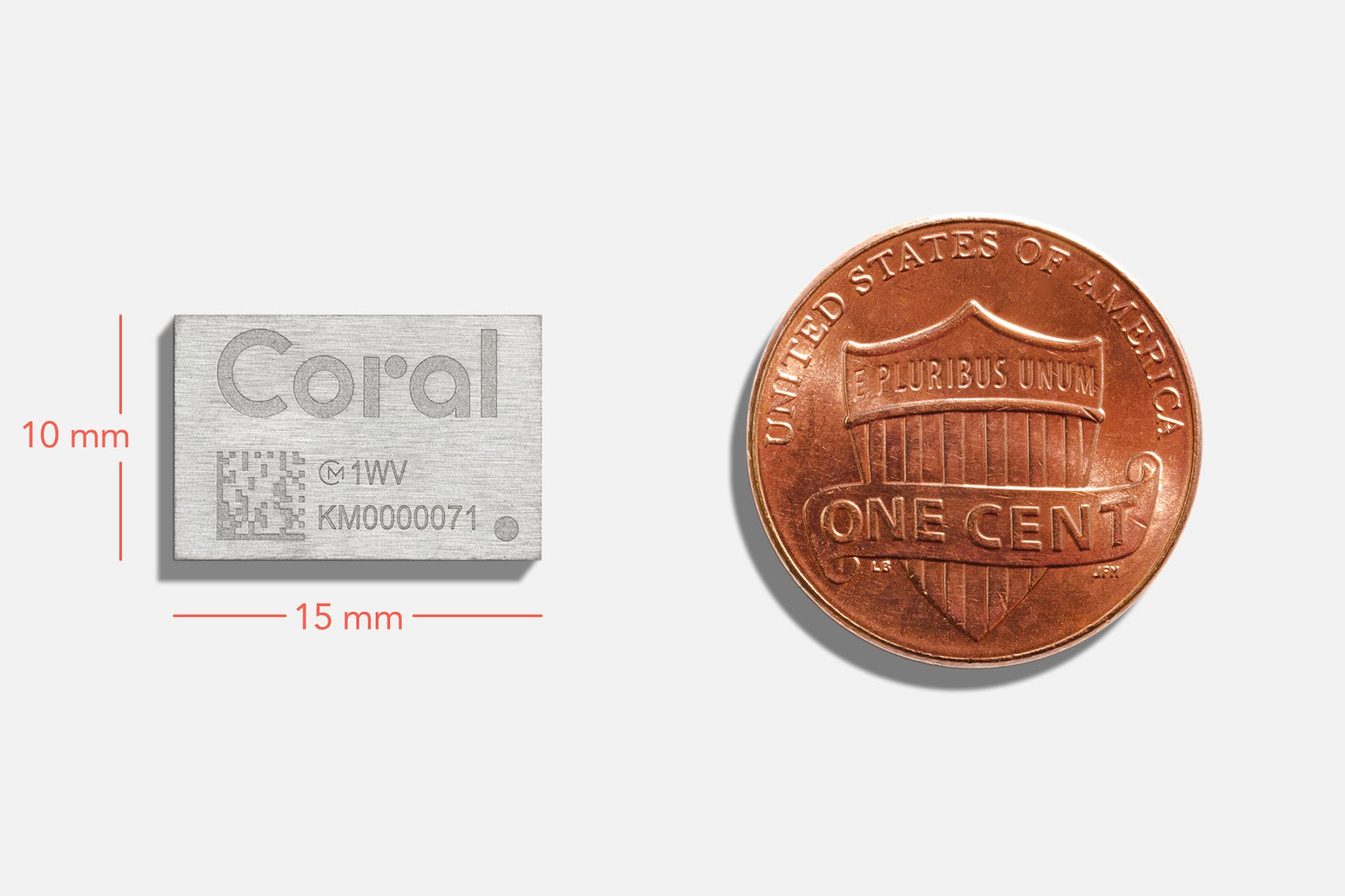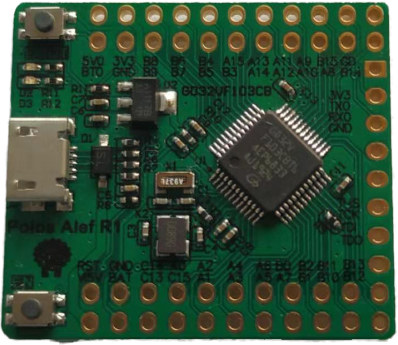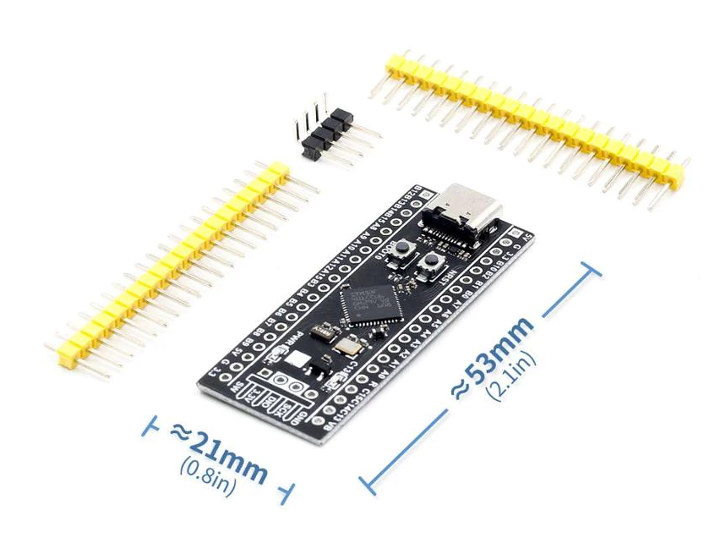Wemos has designed some great WiFi IoT boards over the last few years with products like Wemos D1 mini or Lolin32 based on Espressif Systems ESP8266 and ESP32 processors respectively. But the company has recently launched its cheapest board ever, with W600-PICO board going for just $2.10 + shipping. The board is based on Winner Micro W600 Arm Cortex-M3 WiSoC, and comes pre-loaded with MicroPython firmware. Wemos W600-PICO V1.0.0 specifications: SoC – Winner Micro W600 Arm Cortex-M3 MCU @ 80MHz with 1MB Flash Wireless Connectivity – 2.4GHz 802.11 b/g/n WiFi 4 up to 150 Mbps USB – 1x Micro USB port for power and programming (via CH340 USB to TTL chip) Expansion – 2x 10-pin headers with 15x GPIO, 9x PWM, 1x I2C, 1x SPI, 1x UART, Wake Up, Reset, 5V, 3.3V, and GND signals; 3.3V I/O voltage. Misc – Reset button Power Supply – 5V via micro USB port […]
Seeeduino XIAO is a Tiny Arduino Zero Compatible Board with Battery Support
Seeeduino XIAO is the smallest Arduino compatible board from SeeedStudio’s Seeduino family. Measuring just 23.5×17.5 mm, the board is equipped with Microchip SAMD21 Arm Cortex-M0+ microcontroller and exposes various digital and analog I/Os. Seeduino XIAO specifications: MCU – Microchip SAMD21G18 ARM Cortex-M0+ microcontroller at up to 48MHz with 256KB Flash,32KB SRAM USB – 1x USB type C port for power and programming Expansion I/Os 2x 7-pin headers with 11x analog inputs, 11x digital I/Os, 1x DAC, SPI, UART, and I2C 3.3V I/O voltage (not 5V tolerant) Misc – 1x user LED, power LED, 2x LEDs for serial port downloading, Reset pads, SWD pads, 32.768KHz crystal oscillator Power Supply – 5V via USB-C power, power pads (VIN/GND) for battery Dimensions – 23.5×17.5×3.5 mm All main components are placed under a shield, but there may be some charger chip (nope: see comments) as the company explains the board supports batteries via the […]
Arduino Portenta H7 STM32H7 Cortex- M7/M4 Industrial Board Runs Arduino Code, Python and JavaScript
Arduino is now at CES 2020 promoting its Arduino Pro all-in-all IoT solution for professionals with the Arduino Pro IDE, Arm Pelion IoT platform for device management, and a new Portenta industry-grade board family starting with Arduino Portenta H7 board powered by STMicro STM32H7 dual-core Arm Cortex-M7/M4 microcontroller. Arduino Portenta H7 Specifications: Microcontroller – STMicro STM32H747XI Cortex-M7 @ 480 MHz + M4 @ 200 MHz MCU with 2MB dual-bank Flash memory, 1 MB RAM, Chrom-ART graphical hardware accelerator System Memory – 2MB SDRAM (upgradeable up to 64MB) Storage – 16MB QSPI NOR Flash (Upgradeable up to 128MB) Connectivity 2.4GHz WiFi 802.11b/g/n up to 65 Mbps and Bluetooth 5.1 BR/EDR/LE via Murata 1DX module On-board 10/100M PHY Video I/F – MIPI DSI & 8-bit camera interfaces via 80-pin expansion connector, DisplayPort over USB-C port USB – 1x USB 2.0 Type-C port for power (PD), programming, and DisplayPort output I/Os Arduino MKR […]
MYIR Launches SoM & Development Board based on STM32MP1 Microprocessor
MYIR, the Chinese based company that has developed several ARM-based hardware solutions, has introduced a new SoM powered by the ST’s STM32MP1 microprocessor called the MYC-YA157C CPU Module with an accompanying development board known as the MYD-YA157C development board. Early last year, STMicro announced the introduction of the STM32MP1, the first STM32 MPU (Microprocessor Unit) that features one or two Arm Cortex-A7 cores running Linux, as well as an Arm Cortex-M4 real-time core making it possible to use previous STM32 codes on the new unit. Although, less than 1-year-old, the STM32MP1 microprocessor has since be deployed on a couple of development boards like the STMicro’s own discovery kits and evaluation platform, Emtrion emSBC-Argon, PanGu single-board computer, and even octavo systems unveiled the OSD32MP15x system-in-package. One primary observation with these other developments boards is their relatively steep cost, and something MYIR aims to address. MYiR MYC-YA157C STM32MP1 CPU Module The MYC-YA157C […]
NXP i.MX 8M Plus Processor Targets AI Applications with a 2.3 TOPS Neural Processing Unit
NXP has just announced its first i.MX processor with a dedicated neural processing unit (NPU) at CES 2020. The NXP i.MX 8M Plus SoC is built upon the existing i.MX 8M Nano family with a quad-core Arm Cortex-A53 processor running at up to 2GHz, an independent real-time Cortex-M7 microcontroller @ 800MHz, and a Vivante 3D GPU, but adds a 2.3 TOPS NPU to the mix. The NPU will enable advanced machine learning inference at the industrial and IoT (Internet-of-Things) edges for applications such as people and object recognition for public safety, industrial machine vision, robotics, hand gesture, and emotion detection with natural language processing. NXP i.MX 8M Plus key features and specifications: CPU – Quad-core Arm Cortex-A53 processor @ up to 2.0 GHz with 512KB ECC cache Real-time MCU – Arm Cortex-M7 @ up to 800 MHz GPU – Vivante GC7000UL 3D GPU, Vivante GC520L 2D GPU DSP – HiFi […]
Google Coral mPCIe and M.2 Cards for Sale, New Coral Dev Board Mini and Modules Coming in 2020
Google introduced Coral development board and USB accelerator with Google Edge TPU last year. The development board was comprised of a baseboard and Coral system-on-module with an NXP i.MX 8M quad-core Arm Cortex-A53 processor and the Edge TPU. Since then ASUS announced Tinker Edge T and CR1S-CM-A SBC based on the Coral module, and yesterday, I noticed Seeed Studio started selling mPCIe and M.2 AI accelerator card with Google Edge TPU, while today, Google announced upcoming Coral products for 2020. Coral Mini PCIe and M.2 Accelerators Coral Mini PCIe card specifications: Half-mini PCIe card with PCIe Gen2 x1 Supply voltage – 3.3VDC +/- 10 % Dimensions – 30.00 x 26.80 x 2.55 mm Weight – 3.6 g Temperature Range – Storage: -40 ~ 85°C; operating: -20 ~ 70°C Relative humidity – 0 ~ 100% (non-condensing) Op-shock – 100 G, 11ms (persistent); 1000 G, 0.5 ms (stress); 1000 G, 1.0 ms […]
Polos GD32V Alef is a Tiny RISC-V MCU Board Selling for $3
We first found out about GigaDevice GD32V 32-bit RISC-V MCU last summer, as an update/alternative to the earlier STM32 compatible GD32 Arm Cortex-M3 microcontroller from the company with higher performance and lower power consumption, while keeping the price identical. The first low-cost GD32V development board we covered was Longan Nano going for $5 with an OLED display and an acrylic case. If you don’t need either or want to access all pins from the 48-pin MCU, you can now order an even cheaper GD32V RISC-V MCU board with Polos GD32V Alef going for $2.99 on Analoglamb website. Polos GD32V Alef board specifications: MCU – Gigadevice GD32VF103CBT6 32-bit RISC-V (rv32imac) microcontroller @ 108 MHz with 128KB Flash, 32KB SRAM USB – 1x micro USB OTG port for power and programming Expansion – 52 through holes (2.54mm pitch) exposing all pins from the MCU including 3x USART, 2x I2C, 3x SPI, 2x […]
$3 STM32 “Black Pill” Board Features STM32F4 Cortex-M4 MCU, Optional SPI Flash
STM32 “Blue Pill” is a popular, and cheap (>$2) development board based on STMicro STM32F103C8T6 Arm Cortex-M3 microcontroller and programmable with the Arduino IDE. I’ve just been informed the board got an upgrade of sorts with a “Blue Pill 2” board featuring either STM32F401CCU6 or STM32F411CEU6 Arm Cortex-M4F microcontroller, and a USB Type-C port for power and programming. It’s black, so instead, I’ll call Black Bill as some others appear to do. Specifications for the Blue Pill & Black Pill boards (new features in bold): MCU (one of the other) STMicro STM32F103C8T6 ARM Cortex-M3 MCU @ 72 MHz with 64KB flash memory, 20KB SRAM. STMicro STM32F401CCU6 Arm Cortex-M4F MCU @ 84 MHz with 256 KB flash, 64KB SRAM STMicro STM32F411CEU6 Arm Cortex-M4F MCU @ 100 MHz with 512KB flash, 128KB SRAM Storage – Footprint for SPI flash USB Blue Pill – 1x micro USB port for power and programming Black […]


